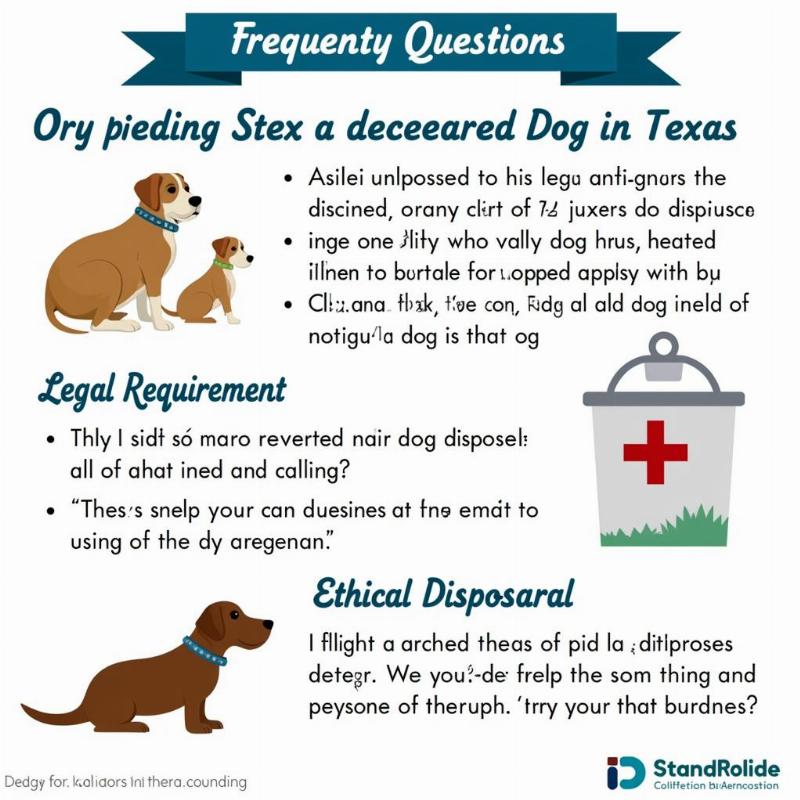Losing a beloved canine companion is a heartbreaking experience. Navigating the practicalities following their passing can feel overwhelming during this difficult time. This guide provides a comprehensive overview of how to respectfully and legally dispose of a dead dog in Texas. Understanding your options and the relevant regulations will help you make informed decisions that honor your pet’s memory.
Understanding Your Options for Pet Aftercare in Texas
Texas law allows for several options for handling a deceased pet, including burial, cremation (communal or private), and rendering. Each option has its own considerations, including cost, environmental impact, and personal preference. Choosing the right method can help you find closure and peace of mind after your pet’s passing.
Home Burial
If you own property in Texas, you may bury your pet on your land. This is often the most personal and economical option. However, ensure local ordinances permit home burial, especially within city limits. You should bury your pet deep enough (at least 3 feet) to prevent other animals from disturbing the remains.
Cremation Services in Texas
Cremation is a popular choice for pet aftercare in Texas. Many veterinary clinics offer cremation services, or you can contact a dedicated pet crematory directly. Communal cremation is a more affordable option, where your pet is cremated with other animals, and the ashes are not returned. Private cremation allows you to receive your pet’s ashes in an urn, allowing for a more personalized memorial.
Rendering Services
Rendering is a less common but legal option in Texas. Rendering plants process animal remains into byproducts used in various industries. While this option may not be suitable for everyone, it is a legally sanctioned method of disposal.
Navigating Texas Regulations for Deceased Pets
Texas law dictates specific requirements for handling deceased animals. It’s crucial to understand these regulations to ensure compliance and avoid potential legal issues. These laws often focus on preventing the spread of disease and maintaining public health.
Understanding City Ordinances
City ordinances regarding pet burial and disposal may vary. Contact your local animal control or city government to inquire about specific regulations in your area. Some cities may restrict home burial or require specific containers for transporting deceased pets.
Working with Your Veterinarian
Your veterinarian is a valuable resource during this difficult time. They can guide you through the available aftercare options in Texas, explain relevant regulations, and even assist with arrangements for cremation or other services.
Frequently Asked Questions about Disposing of a Deceased Dog in Texas
-
What if I find a deceased dog that isn’t mine? Contact your local animal control or city services. They will handle the removal and disposal of the animal.
-
Can I bury my dog in a public park? No, burying pets in public parks is generally prohibited. Contact your local parks and recreation department for specific regulations.
-
What is the average cost of pet cremation in Texas? Costs vary depending on the type of cremation (communal or private) and the provider. Communal cremation is typically less expensive than private cremation.
-
Are there any environmental considerations for pet burial? Ensure you bury your pet deep enough to prevent contamination of groundwater. Avoid using plastic bags or non-biodegradable materials for wrapping the body.
-
How long can I keep my deceased pet at home before disposal? It’s best to make arrangements for disposal as soon as possible. If you cannot bury or cremate your pet immediately, refrigeration is recommended.
-
Can I transport my deceased pet across state lines for burial or cremation? Regulations vary by state. Contact the relevant authorities in both states for specific requirements.
-
Are there any financial assistance programs for pet aftercare in Texas? Some animal welfare organizations may offer financial assistance for pet cremation or burial. Contact your local shelters or rescue groups for information.
 FAQs about handling a deceased dog in Texas
FAQs about handling a deceased dog in Texas
Conclusion
Dealing with the loss of a pet is a deeply personal experience. Understanding the options for disposing of a dead dog in Texas allows you to make informed decisions that align with your values and local regulations. Whether you choose home burial, cremation, or rendering, remember that each option offers a way to honor the memory of your beloved companion. Reaching out to your veterinarian or local animal control can provide valuable support and guidance during this challenging time.
Beautdogs.us is your premier resource for all things dog-related in the United States. From breed-specific advice to expert guidance on dog care and training, we offer a comprehensive and trustworthy platform for both novice and seasoned dog owners. Explore our extensive collection of articles and resources to enhance your journey with your canine companion. For inquiries or further assistance, contact us via email at [email protected] or by phone at +1 501-555-7529. Beautdogs.us is committed to providing you with the most up-to-date information and resources for a happy and healthy dog.